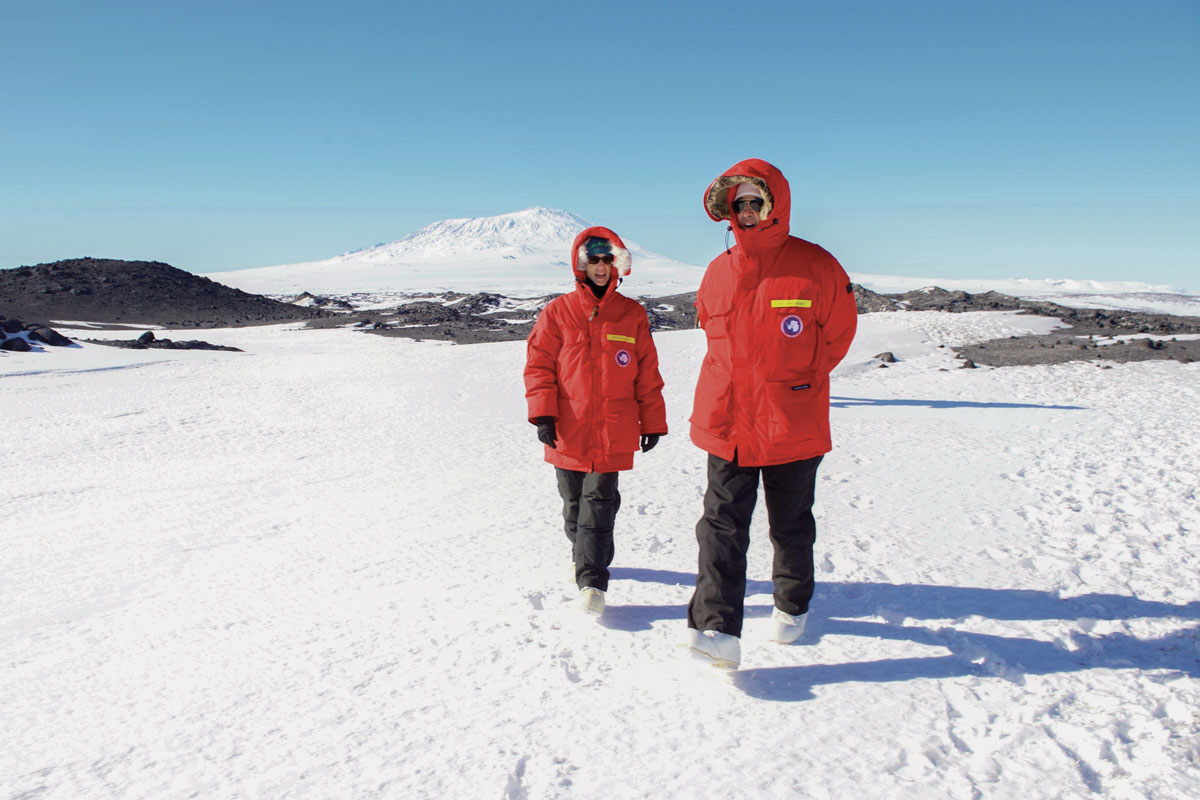The Polar Pundit
Professor, public servant, and polar expert Kelly Falkner ’83 has a lot to show for her 40-year science career, including her very own Antarctic glacier.
Two nautical miles south of Oakley Glacier in the Mountaineer Range of Victoria Land, Antarctica, is an expanse of ice four nautical miles long descending into Lady Newnes Bay. From the cockpit window on her way to McMurdo Station, Kelly Falkner ’83 has only glimpsed the glacier that was named after her, and she’s modest about the honor. “Lots of people have features named for them, and mine is not a mountain or a mountain range, it’s a small glacier,” she says. Her colleagues at the National Science Foundation (NSF) named the ice floe after her in 2008 for her work as director of the Office of Polar Programs. Eventually, Kelly admits with a smile, “I was really happy when it happened.”
Since she was young, Kelly has had this “unfortunate” trait—at least that’s how she puts it—where when someone tells her she can’t do something, she has to go show them she can. When she came to Reed, everyone said organic chemistry was the hardest course to take, but she enrolled and aced it. On long sea excursions at the beginning of her career, she ignored the men who said women didn’t belong on ships. And her over-40-year science career and the Falkner Glacier are two more testaments to the ways she accomplished everything others may have thought she couldn’t.
Her career became defined, in part, by this go-getting quality. After studying chemistry and Russian at Reed, Kelly focused on the analysis of elements oceanographers had yet to study as a graduate student at the Massachusetts Institute of Technology. The following years involved her constantly working on the cutting edge of analysis and discovering what new tools could be used to bear on problems in the world’s oceans. In the early ’90s, she pioneered inductively coupled plasma quadrupole mass spectrometry, an analysis tool that can measure all kinds of trace elements at once.
That work led her to measure the chemical makeup of water all over the world, from the oceans to the Greenland Ice Cap to Lake Baikal to the Black Sea. As a chemical oceanographer, Kelly sampled and analyzed snow, ice, rivers, lakes, seas, and the oceans to better understand geochemical issues occurring in the Arctic, and she testified before Congress about the importance of studying polar regions in relation to climate change. The water flowing from the Arctic affects ocean circulation, and thus the overall climate. In her career as a research scientist, professor, and the first female director of the NSF Office of Polar Programs, Kelly sought to bring attention to the polar regions and their important ties to our changing planet.
While with the Office of Polar Programs, she oversaw science researching and logistics support programs in the Arctic and Antarctic. Kelly completed her public service on assignment to the Office of Science Technology and Cooperation of the State Department, where she crafted science policy—including an expression of the U.S.’s position regarding science cooperation with the Russian government after Russia invaded Ukraine in 2022, an experience Kelly said was heartbreaking and psychologically difficult. But it was also a full-circle moment, tying back to her Russian studies at Reed.
Now in retirement, Kelly continues to be a go-getter. When we met, she’d just returned from a five-month thru-hike on the Appalachian Trail, a trip that can be difficult even for experienced hikers. After the adventure she’s had, Kelly admits that “unfortunate” trait of hers has provided some “very fortunate” benefits.
Tags: Alumni, Climate, Sustainability, Environmental, Research
